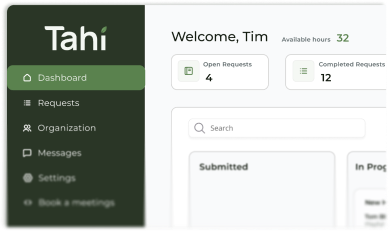
One Studio for Everything Webflow
We’re a digital studio built around Webflow, covering everything from first click to final launch. Our flexible plans and unlimited add-ons make it simple to build a service that's perfectly tailored to your goals.





How It Works
Your Project, Perfectly Organized
Say goodbye to messy emails and scattered files. Our client dashboard brings all your requests, communication, and timelines into one clear space, giving you total peace of mind.
1
Choose a Plan & Instantly Get Started

2
Add Unlimited Requests to Your Queue

3
Watch as Our Team Brings Your Vision to Life

Simple, clear, and built for partnership.
Our Services
Services Designed for Your Goals
Webflow
Development
Already have designs? Our expert developers will turn your vision into a high-performing, pixel-perfect Webflow site built with care.

Design &
Development
We take your project from the first sketch to a fully developed Webflow site. Our integrated process ensures a seamless journey from design to launch.

Graphic &
Web Design
From custom graphics to complete site design, we build a cohesive visual identity that prepares your brand for a flawless Webflow presence.

We Fit Your Stage
We Meet You Where You Are
Whether you're reimagining your brand or launching something new, Tahi Studio adapts to your current needs. Our flexible approach means you get exactly what you need, right when you need it.

& Beyond
We are here as your long-term growth partner.

Launch
We ensure a smooth and confident project launch.

Build
Our team handles pixel-perfect, expert Webflow development.

Design
We craft intuitive and thoughtful user-centric designs.

Planning
We create a clear and strategic roadmap together.
Tahi Studio Perks
A Refreshingly Simple Process

Unlimited Requests
Submit as many requests as you need. We'll work through your queue to keep progress steady.
Focus on Quality
From pixel-perfect design to clean development, our meticulous craft ensures the highest standards.

Flexible Pricing
Pay for exactly what you need with our flexible plans. Scale up or down as your goals change.
Total Team Support
Get our entire team of designers, developers, and strategists on your side.

Fast Turnaround
Most requests are completed in just a few business days, not weeks, helping you move faster.

A Clear Process
Manage all requests, files, and communication from one simple dashboard.
Our Showcase
One Partnership, Endless Possibilities
"Tahi have been brilliant to work with. Friendly, fast and always deliver high quality work. Everything’s been smooth from the start and they’ve made the whole process easy. I’d highly recommend them to anyone looking for a reliable web team."



"Tahi have been brilliant to work with. Friendly, fast and always deliver high quality work. Everything’s been smooth from the start and they’ve made the whole process easy. I’d highly recommend them to anyone looking for a reliable web team."



"Tahi have been brilliant to work with. Friendly, fast and always deliver high quality work. Everything’s been smooth from the start and they’ve made the whole process easy. I’d highly recommend them to anyone looking for a reliable web team."












Let's Become Partners
One Team, Your Team
You don’t need another agency, you need a partner. We fit into your team like in-house staff, collaborating with clarity, speed, and care.


Clear Communication
Fast replies. Always in the loop.

Shared Success
Your goals become our goals.

Flexible Growth
Add new services as you scale.
Benefits of Tahi Studio
One Dedicated Partner
A true partnership built on expertise and honest communication. Your goals guide us.

A True Partnership
We integrate with your team, making your business success our core focus.

Honest & Transparent
You get clear pricing and honest communication. No hidden fees or surprises.

Complete Flexibility
No long-term contracts. Pause or cancel your subscription anytime.

A Web for Everyone
We build to accessibility standards so your website welcomes everyone.

Expert Webflow Craft
Our Webflow experts build your project with genuine care and attention to detail.

For a Better Planet
We commit 10% of profits to support environmental causes and carbon offsets.
Frequently Asked Questions
Everything You Need To Know
What kind of tasks can I request?
On the Development plan, you can request any Webflow build, update, or integration. On the Creative Design plan, you can request anything from web and app UI/UX to logos, brand assets, and marketing materials. The Design & Dev plan includes everything from both.
How fast will my requests be completed?
Most small requests are completed in just a few business days. For larger, more complex tasks, we'll establish a clear timeline and keep you updated on our progress every step of the way.
What if I need to pause or cancel my subscription?
No problem. You can pause or cancel your subscription at any time through your client dashboard. Our goal is to earn your partnership every month, not lock you into a long-term contract.
How does the "unlimited requests" subscription work?
You can add as many requests to your queue as you'd like. We work through them one at a time to ensure each task gets our full attention and quality is never compromised. Once a task is complete, we immediately move to the next one.
What is the benefit of a subscription over hiring a freelancer?
Our subscription gives you access to a diverse team of senior-level experts—designers, developers, and strategists—for one predictable price. This provides more reliability, a broader skillset, and greater scalability than a single freelancer can offer.
Who actually works on my projects?
Your projects are always led by our core team of senior experts. We assemble the best talent for each task, and every deliverable is managed and approved internally to meet our unwavering commitment to quality.





